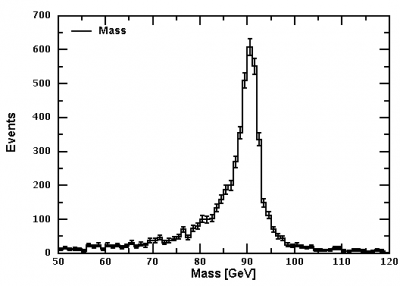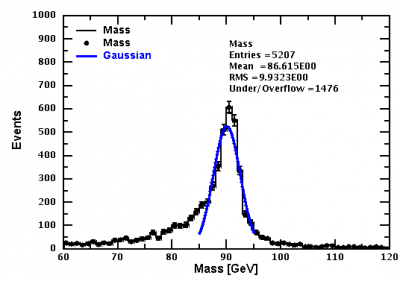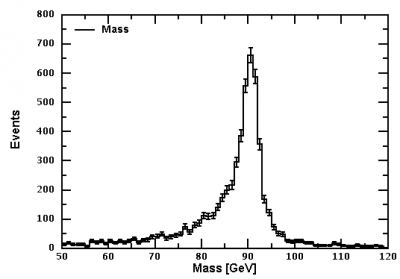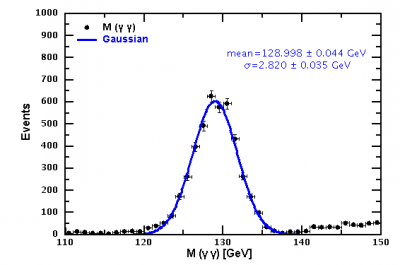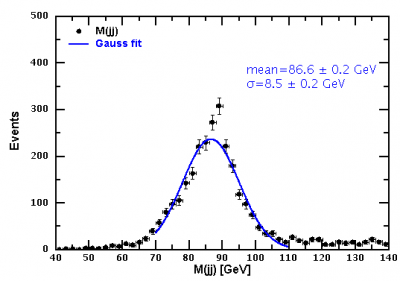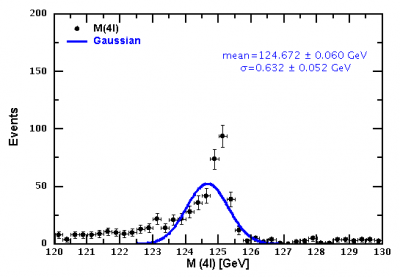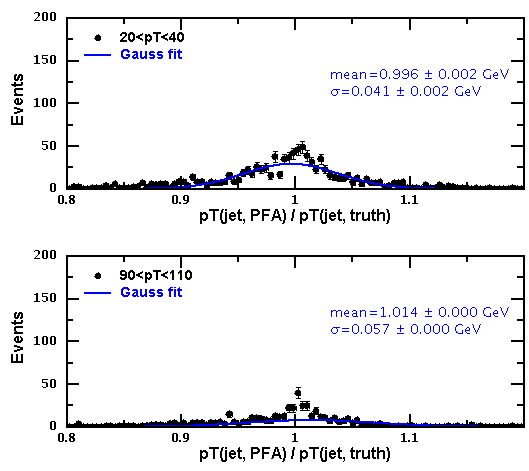Table of Contents
CEPC detector studies
People: S.Chekanov, M.Demarteau
This wiki explains how to view electron-proton collision events for CEPC. To analyse events for such studies, install Jas4pp program (assumes “bash”):
wget http://atlaswww.hep.anl.gov/asc/jas4pp/download/current.php -O jas4pp.tgz tar -zvxf jas4pp.tgz cd jas4pp source ./setup.sh # takes 5 sec for first-time optimization
Description is available from https://wiki.inside.anl.gov/inside/HEP/CEPC.
Z-peak using PFA
Let's calculate Z peak from particle-flow objects after full reconstruction using Pandora. You do not run “hs-get” command if you have done this before.
cd examples/slic/ hs-get gev250ee_pythia6_zpole_ee%rfull002 gev250ee_pythia6_zpole_ee # download all files fpad mc_pflow.py
you can also do do some simple fit:
fpad mc_pflow_fit.py
Z-peak using tracks
Let's calculate Z peak from reconstructed tracks (no Pandora and no particle identification) You do not run “hs-get” command if you have done this before.
fpad mc_tracks.py
Please correct on line 47 the variable Bfield=5 to Bfield=4 Tesla!
Higgs from γ γ
Let's calculate the Higgs peak from reconstructed photons after the PFA algorithm. This time you will need H→ gamma+gamma sample gev250ee_pythia6_higgs_gamgam: We set pT(γ)>10 GeV.
hs-get gev250ee_pythia6_higgs_gamgam%rfull002 gev250ee_pythia6_higgs_gamgam
fpad mc_gammagamma.py
Z-peak using b-jets
Let's calculate Z peak from reconstructed b-jets. Jets are reconstructed using the Durham kT algorithm with ycut=0.05. This time we will download Z→ bbar sample. Look at gev250ee_pythia6_zpole_bbar. We assume pT(jet)>20 GeV.
hs-get gev250ee_pythia6_zpole_bbar%rfull002 gev250ee_pythia6_zpole_bbar
fpad mc_jets.py
No any optimization for jet reconstruction was used. Consider other approaches to make more realistic dijet mass.
Higgs from 4 leptons
Let's calculate Higgs peak from reconstructed leptons in the channel H(125)→ ZZ* → 4L (electrons and muons). We will use particle flow objects to reconstruct and identify electrons and muons. This time we will download Higgs→ 4 lepton sample. Look at gev250ee_pythia6_higgs_zz_4l.
hs-get gev250ee_pythia6_higgs_zz_4l%rfull002 gev250ee_pythia6_higgs_zz_4l # download 100 files in 2 threads fpad mc_higgs_zz.py
Higgs from bbar
This example uses the Jade algorithm to force 2 jets, and uses H→ bbar sample:
hs-get gev250ee_pythia6_higgs_bbar%rfull002 gev250ee_pythia6_higgs_bbar
fpad mc_higgs_bbar.py
Jet energy resolutions
This example shows the jet energy resolution in 2 pT(truth) regions. It is based on inclusive jet sample gev250ee_pythia6_qcd_all. We use Durham jets with pT(truth)>20 GeV. Jet are constructed from PFA objects. Truth jet and reco jets are matched using dR<0.05 in phi and rapidity.
hs-get gev250ee_pythia6_qcd_all%rfull002 gev250ee_pythia6_qcd_all
fpad mc_jets_resol.py
Wired Visualization
You can run Jas+Wired to visualize the simulated events. The Wired program is included in the Jas4pp program. Run it as:
jaspp sifcch1.heprep
You can download the heprep file from http://atlaswww.hep.anl.gov/hepsim/soft/detectors/sifcch1/sifcch1.heprep; Alternatively, visualize the detector as [File]-[Open data source]-[HepRep] XML. You will see the detector layout.
Now, we will visualize a single event: Open any *.slcio file you copied from HepSim as [File]-[Open data source]-[LCIO] file. Then click a small button [Go] (top menu bar). It will process events. Then select again [File]-[New]-[Wired 4 view]. You will get an image in the Wired4 display as this:
Now press [Go] again to look at next event.
If you want to see how data records are organized inside the slcio file, do this [File]-[New]-[LCSim Event browser]
To view “slcio” files, Jas4pp automatically downloads the detector geometry from http://atlaswww.hep.anl.gov/hepsim/soft/detectors/, therefore, you do not need manual download of heprep files.
— Sergei Chekanov 2015/10/08 09:31
